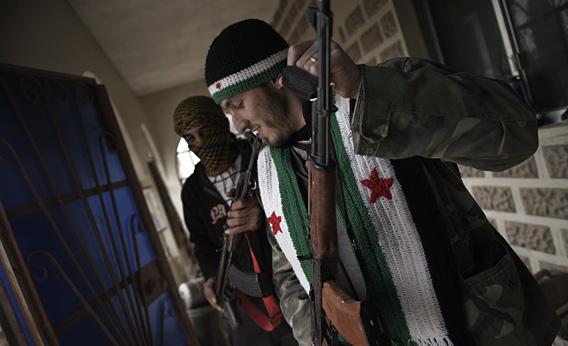“We are not pretending that the human rights situation in Syria is perfect. … We are aware that there is a regression in the quality of services usually provided by the government to the population by the regions facing violence.”
—Fayssal al-Hamwi, Syria’s ambassador to the United Nations in Geneva, Feb. 28
On Sunday, Syrians “voted” in a constitutional referendum that reflected “citizens’ keenness on moving forward with the reform process,” in the words of the government’s news agency. On the same day, 17 more people were killed in Homs by the government’s military forces, while the International Red Cross tried, and failed, to negotiate safe passage for the wounded out of the city. The Syrian regime now has two faces: the pseudo-democratic one it turns to the outside world and the vicious one it turns on its own people.
Although that contrast is clear, a Western military coalition of the willing isn’t going to emerge quickly on behalf of Syria, as it did for Libya. Syria’s ethnic divisions resemble those in Iraq; its ruling clique is sustained by Iran; its opposition is chaotic; and some of its population is so scared of what might come next that they may be inclined to support the regime. The Syrian army has better weapons than the Libyan army (which itself collapsed only in the nick of time, just before NATO’s ammunition ran out), and Western publics are war-weary. But before we throw up our hands and let the Saudis send jihadists to “help” the Syrian rebels (the way they once “helped” the Afghan mujaheddin), we have several more cards to play.
One of them involves taking Syria’s human rights rhetoric seriously—and turning it against the regime. Amnesty International, Human Rights Watch, the United Nations, and others have diligently collected, compiled, and published evidence of the regime’s human rights abuses, including the names and positions of Syrian officers who ordered soldiers to fire on unarmed demonstrators; accounts of torture and arbitrary detention; descriptions of rape, abuse, and murder of children; and evidence of the mass slaughter of regime opponents over many years. It’s time to refer this material to the United Nations, the Arab League, the International Criminal Court (not a body I like, but since it exists we should use it); to hand it publicly to Syrian officials; to read it in Arabic on the radio; to use it in statements and at news conferences. A single speech by the American president or the British prime minister that named the criminal Syrian army officers could have an enormous impact, once it has been beamed back into Syria via radio, satellite television, the Internet, and word of mouth.
So far, Western leaders have refrained from this kind of language because, as Hillary Clinton put it this week, using labels like “war criminal” to describe Syria’s president, Bashar al-Assad, can “limit options to persuade leaders to step down from power.” She is right—which is why rhetoric aimed at delegitimizing the regime should be accompanied by immediate and strenuous efforts to not only unify the opposition but also to get its disparate members talking about the post-Assad future. In particular, the Syrian rebels need to start talking about transitional justice: how, exactly, former regime allies will be treated; how real criminals will be distinguished from mere collaborators; how victims will be compensated; and how the minority rule of a dictatorial clan can be ended without bloodshed.
This isn’t an impossible dream: South Africa managed to avoid civil war, in an analogous (though hardly identical) situation. Violence there was avoided in part because the outgoing minority participated in the transition. If some of the Alawite elite can be persuaded to do the same, Syria stands a chance of avoiding civil war. There isn’t anybody to talk to in Assad’s immediate circle—all of them have blood on their hands—but if the Syrian rebels can reassure others in Damascus, Alawites as well as Christians, that they won’t become the targets of a campaign of revenge, then they stand a better chance of persuading more people to switch sides. The crucial moment of the revolution—when the regime’s supporters begin to sympathize with their opponents—may well be fast approaching.
One way or another, this conflict will end. Assad will fall—or he will remain in power thanks to a bloodbath, followed by another era of sullen repression. Either way, one of the best things the West can do now is help Syrian rebels and the Syrian diaspora think about what might come next. It seems ridiculous to focus on the future in the middle of a crisis. But in this case, that might be the only way the crisis can be resolved.
How To Solve Syria
The West isn’t going to save the country’s battered opposition. But that doesn’t mean we don’t have cards to play.

Members of the Free Syrian Army get ready to leave to an undisclosed location in the outskirts of Qusayr, near Homs
Gianluigi Guercia/AFP/Getty Images.
Advertisement